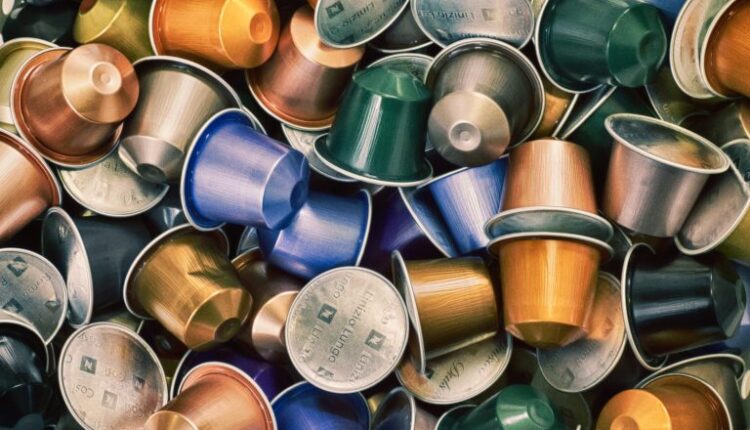The Problem With Creating A Genuinely Recyclable Keurig Coffee Pod – CoffeeTalk
Keurig, a popular single-serve coffee brewing system, has been a major source of waste since the early 2000s. The company’s K-cups, or single-use coffee pods, are made of polypropylene plastic, which is not as recyclable as consumers believe. Two of the country’s largest recycling companies do not accept K-cup pods, and one environmental group estimates that if all K-cup pods were lined up in the world’s landfills side by side, they would circle the globe 10 times.
A new coffee pod company, Cambio Roasters, claims to have developed a solution to Keurig’s plastic waste problem. Cambio Roasters offers a Keurig-compatible coffee pod made out of aluminum, which is infinitely recyclable, unlike plastic. The company is led by a team of former Keurig employees, including founder and CEO Kevin Hartley. However, experts are skeptical about Cambio’s understanding of the significant problem K-cups pose to curbside recycling systems.
The fragmented nature of the American recycling landscape makes it difficult to create a truly recyclable packaging option for consumer goods. With over 10,000 recycling systems in the U.S., only a quarter of the population has access to recycling, making the question of whether something is recyclable only accurately answered on a local level.
The plastic composition of most K-cup pods also poses a problem. Sustainability concerns have followed the Keurig brand closely as it has scaled. In 2016, Keurig started selling K-cups made of polypropylene with the goal of making 100% of K-cup pods “recyclable” by 2020. However, the company has run into trouble for touting recyclability. In 2018, a California resident sued Keurig for claiming that K-cup pods could be recycled after the foil lid was removed and the coffee grounds were rinsed or dumped out, leading to a $10 million class-action settlement.
Keurig, a popular single-serve coffee company, has been working on a plastic-free K-cup option for years. After years of prototypes and testing, the company settled on aluminum as an easier-to-recycle alternative. Aluminum is also impervious to oxygen, which causes coffee to lose its flavor over time. Cambio Roasters, an aluminum single-use coffee pod company, launched earlier this year as a plastic-free alternative for Keurig coffee pods.
Cambio is not the first single-serve coffee company to opt to ditch plastic or invest in circularity. Nespresso, a popular single-serve coffee company owned by the Nestlé Group, has made its capsules out of aluminum for over 30 years. In 2020, Nespresso announced that its pods would be made of 80 percent recycled aluminum, and it claims its global recycling rate is 32 percent. But Nespresso pods only work in Nespresso machines. Because Cambio coffee pods are designed to work with Keurig models, Hartley hopes to give consumers what they want “without having to buy a new brewer.”
Cambio also allows users to peel back the lid and dump out the grounds before recycling. Nespresso pod lids are difficult to remove, and the company instructs users to recycle their pods as is, grounds and all. However, Nespresso pods are only approved for curbside recycling in New York City and Jersey City, where a designated recycling contractor cleans them out before reprocessing them.
Unfortunately, swapping plastic for aluminum doesn’t automatically solve K-cup pods’ recyclability crisis, experts say. What really prevents coffee pods from having a second life is their size. After collection, recyclables are sorted at a facility known as a materials recovery facility (MRF), which isn’t equipped to collect small items. The K-cups are so small that they fall through the machinery in many recycling facilities, so there’s no good way to recycle them.
Cambio’s approach to working around this is two-pronged. First, the company says it wants consumers to stack used K-cup pods together — and then pinch them closed — to overcome many recycling facilities’ size requirements. Three or more used K-cup pods should create a piece of aluminum large enough to fit through the machinery at recycling facilities.
Cambio is also developing a device that will make this stacking and pinching of used K-cups easier. The company has filed for patents for second-generation Cambio pods that can be “snapped” together after use. Jan Dell, a chemical engineer and environmental nonprofit founder, said that aluminum pods are not a meaningful improvement, citing their small size as a barrier to being accepted and sorted via curbside recycling systems.
Keurig Dr Pepper spokesperson, Keurig, said that the company is “knowing our consumers want simplicity and less waste.” They shared that the company has been lightweighting their pods to reduce the amount of plastic used and increasing options for recycling them, including a soon-to-be-launched program in which customers will be able to mail their used pods to Keurig for recycling. The company is also exploring more sustainable packaging options.
In an interview with the Atlantic in 2015, the inventor of the K-cup said, “I feel bad sometimes that I ever did it.” As the market for single-serve coffee brewers grows, so will its impact on the environment, unless its products are somehow wildly reimagined and redesigned.
Read More @ Grist
Source: Coffee Talk



